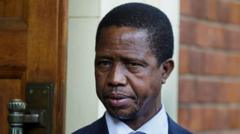In Tehran, a state funeral saw thousands of mourners remember military commanders and nuclear scientists who perished in recent conflicts, highlighting Iran's deep losses.
Iran Holds Emotional State Funeral for Military Leaders and Nuclear Scientists Killed in Conflict with Israel

Iran Holds Emotional State Funeral for Military Leaders and Nuclear Scientists Killed in Conflict with Israel
Thousands pay respects in Tehran for those lost during the 12-day war, as calls for justice echo across the city.
In a somber display of national solidarity, Tehran was awash with mourners on Saturday as they gathered for a state funeral honoring around 60 individuals killed during a 12-day conflict with Israel. Prominent Iranian military commanders and notable nuclear scientists were among those memorialized.
As the procession unfolded, live coverage by state television depicted a stark contrast to the war's recent strife, as previously deserted streets transformed into a sea of green, red, and white Iranian flags. The atmosphere was charged with the resounding chants of “Death to America” and “Death to Israel” that have become synonymous with public sentiment in the Islamic Republic.
The caskets, adorned with Iranian flags and covered in rose petals, were transported via trucks, slowly making their way between two main squares in the capital. From there, it was reported that the remains would be taken to cemeteries for burial, with some deceased likely to be interred alongside family members.
While Supreme Leader Ayatollah Ali Khamenei was absent from the proceedings, President Masoud Pezeshkian participated in the procession, emphasizing the state’s commitment to honor those who made the ultimate sacrifice.
This poignant funeral not only underscored the toll on Iranian military forces, but also brought to light the ramifications of Iran’s controversial nuclear program. Among the mourned, at least 11 distinguished nuclear scientists were reported among the deceased, contributing to a total casualty count of over 600, which also includes a significant number of military personnel.
Among the trucks bearing the fallen was one that reportedly transported the coffins of children, further deepening the tragedy of the conflict. Mourners extended heartfelt gestures towards the caskets, reaching out to touch or kiss them as symbol of their love and sorrow. This event reflects a nation in mourning, grappling with the heavy repercussions of ongoing strife.
As the procession unfolded, live coverage by state television depicted a stark contrast to the war's recent strife, as previously deserted streets transformed into a sea of green, red, and white Iranian flags. The atmosphere was charged with the resounding chants of “Death to America” and “Death to Israel” that have become synonymous with public sentiment in the Islamic Republic.
The caskets, adorned with Iranian flags and covered in rose petals, were transported via trucks, slowly making their way between two main squares in the capital. From there, it was reported that the remains would be taken to cemeteries for burial, with some deceased likely to be interred alongside family members.
While Supreme Leader Ayatollah Ali Khamenei was absent from the proceedings, President Masoud Pezeshkian participated in the procession, emphasizing the state’s commitment to honor those who made the ultimate sacrifice.
This poignant funeral not only underscored the toll on Iranian military forces, but also brought to light the ramifications of Iran’s controversial nuclear program. Among the mourned, at least 11 distinguished nuclear scientists were reported among the deceased, contributing to a total casualty count of over 600, which also includes a significant number of military personnel.
Among the trucks bearing the fallen was one that reportedly transported the coffins of children, further deepening the tragedy of the conflict. Mourners extended heartfelt gestures towards the caskets, reaching out to touch or kiss them as symbol of their love and sorrow. This event reflects a nation in mourning, grappling with the heavy repercussions of ongoing strife.




















